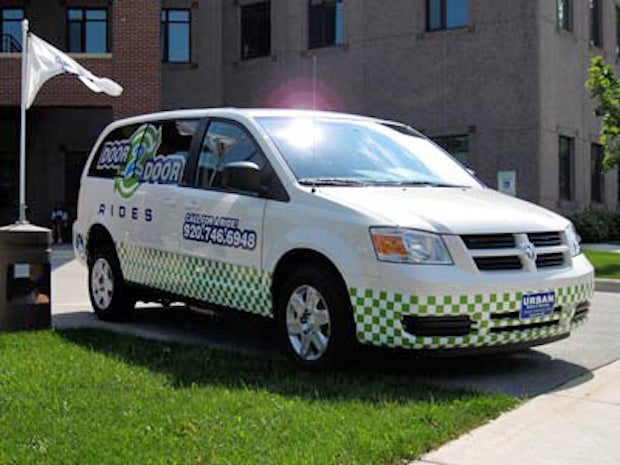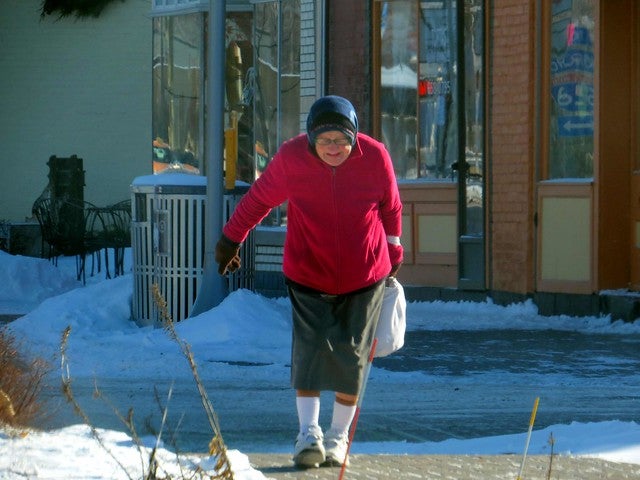A shared-ride taxi system in Door County that mostly serves older adults and people living with disabilities could face some changes as the program’s popularity outpaces funding resources.
Door 2 Door, a county program funded through levies and state and federal resources, serves about 1,800 different riders annually, shuttling riders an average of 42,600 times a year.
The county contracts with transportation service Abby Vans to provide the service, and it allots 444 hours a week to pick up and drop off riders who sign up for available times through a dispatch center.
Stay informed on the latest news
Sign up for WPR’s email newsletter.
“It provides a little bit higher level of service because sometimes it even assists people with moving groceries and that kind of stuff,” said Door County Human Services Director Joe Krebsbach, who is also in charge of the county’s transportation services.
If the Door 2 Door system and other programs that are tied into funding for it aren’t changed, the projected total cost for next year is $973,700.
Four sources of funding sustain the program: state assistance, federal aid, a county tax levy and revenue from fees paid by riders. But changes or adjustments to grants are impacting the program, which is expected to cost $170,000 more next year, and an additional $45,000 on top of that annually through 2024.
The program began in 2010. In 2017, the program saw its highest ridership of 44,000 rides.
The program’s routes initially only covered Sturgeon Bay, but they’ve since been expanded to cover the entire county.
Because of the program’s growth, Krebsbach echoed a recommendation by hired consultants, tasked with reviewing the program: establish a transportation department and head it with its own director. This would take some of the burden off of the human services department, which doesn’t typically manage transportation systems.
“We need to make some decisions about whether or not we’re going to continue to provide that service which requires us to come up with those additional funds,” Krebsbach said.
A majority of users reside in Sturgeon Bay, with its two grocery stores and a doctor’s office being visited most by Door 2 Door riders.
About 72 percent of riders who use the Door 2 Door program either have a disability or are older than 60 years old. Seven percent of riders are students.
“It certainly provides them a level of independence and the feeling of autonomy,” Krebsbach said. “They can get places without having to rely on friends or family members.”
People with disabilities, students and adults age 60 and up, pay $1.75 per ride. The full price per ride is $3.50. The cost per ride is $7 for agencies that contract to use the service.
The county will likely need to decide by June whether to continue the program, scale it back or eliminate it. The county’s contract with Abby Vans expires this year. Bidding out a new system would need to be done by the summer if the county plans to do so.
Getting rid of the program would mean public transportation would only be available through the Aging and Disability Resource Center bus, which already serves senior programs such as Meals on Wheels.
“I’m not sure how they’re going to make a go of it if we eliminate those services,” Krebsbach said of the riders, and noted that while they still got around before the program was set up in 2010, it was less convenient and less frequent.
Reducing the capacity of the program is possible, Krebsbach said. The county can cut the service down to about 45 percent of what’s currently offered to avoid an additional burden on the county.
“That obviously would greatly reduce the system that’s already having trouble keeping up with the capacity demands that we have,” he said.
Popular taxi solutions such as Uber and Lyft aren’t as readily available in areas of Door County, and the county’s tourism industry doesn’t incentivize drivers and instead draws employees to other jobs that pay comparably well, Krebsbach said.
Wisconsin Public Radio, © Copyright 2024, Board of Regents of the University of Wisconsin System and Wisconsin Educational Communications Board.





